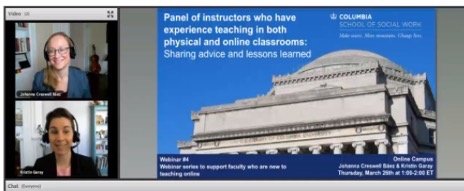Teaching Teachers to Teach Online
I spoke with Matthea Marquart, Assistant Dean, Online Education, Columbia University School of Social Work (CSSW), about the recent project she spearheaded to help instructors meet the teaching challenges of the pandemic. This project, Webinar series to support faculty who are new to teaching online, was named the 2020 IELA Award Winner in the Blended Learning Division.
As instructors around the world scrambled to adjust to a new reality in March of 2020, the Columbia School of Social Work (CSSW) began preparing webinars on the mechanics and techniques of teaching online, particular for an audience of instructors who were new to online teaching. By the end of March, CSSW’s new blended program was already in place with a live webinar series and an online library of program resources.
How did they do it?
Several factors played a role in allowing the CSSW team to produce their webinar series and resource library so quickly, during a difficult time:
They were highly motivated: Being a social worker herself, Matthea felt a keen duty to serve others during the pandemic. She was able to leverage her many years of experience and skills coordinating the CSSW Master of Science in Social Work online program, which had already been in existence for 5 years, as well as her experience coordinating the CSSW development team.
They had a vision: Even in the midst of chaos and uncertainty, CSSW held fast to its own mission of social justice and educational equity by hosting this webinar series online as a free program to be offered to any instructor, anywhere, offering much-needed guidance for those new to online teaching.
They were prepared: The course materials had already been developed as part of CSSW’s online Pedagogy Institute, and the team had a long-standing cadre of presenters who had already taught both online and in person.
Despite being developed so rapidly, out of necessity, the program succeeded in maintaining the highest standards of quality.
The Live Webinars
Beyond covering the basics of online instruction, such as the use of a computer, webcam, and microphone, the webinar series also focused on instructor presence and student engagement. Online discussion revolved around best practices for sharing classroom materials, judicious use of the chat function, and setting the online class norms with flexibility and compassion.
The webinar series included sessions on techniques for engaging students in live online sessions, including the use of chat, polling, and breakout rooms. Tips to help keep students engaged outside of the webinars themselves included the use of announcements in Learning Management Systems, communicating with students while in the process of grading their work in case there are any pandemic-related issues to take into consideration, and encouraging students to reach out to their instructors via email and phone as needed.
Due to the nature of the situation and the professional expertise of the course developers, this blended learning program incorporated elements of the following social work models:
Trauma-Informed Model
There was a recognition that all instructors and students were experiencing a trauma. The program included techniques of self-care and of resilience using the trauma-informed language of choice and empowerment.
Inclusive Community Model
There was a recognition that instructors may be uncomfortable dealing with both overt and more subtle discrimination in the new online instruction format. The program offered ways to be more inclusive. It also offered guidance for instructors on how best to deal with any difficult “micro-aggressive” situations and how to find “teachable moments” in this new environment.
The Resource Library
The blended course included a robust online repository of webinar recordings and related course materials. This on-demand resource model was chosen to meet the unique demands of the moment.
How successful was the program?
Due to the critical need and also to its high quality, this program was a greater-than-anticipated success. It reached a wide audience of instructors around the globe, at all teaching levels from kindergarten to graduate school.
Some participant feedback which best summarizes the way the program met the instructors’ needs:
“I walked away feeling empowered and supported… The webinars provided great comfort and validation to me and I did not feel alone anymore during these challenging times.” (Haoning Richter, CPA, CIA, CCEP)
“The webinars hosted…were such a lifesaver…! I had never taught online and was not at all comfortable with the idea. I didn’t even know where to begin…” (Madeline Y. Lee, MSSW, PhD)
Over 750 instructors registered for the live webinars. To date, views of the webinar recordings number to close to 5,000. The online CSSW resource library at https://bit.ly/CSSW_WebinarSeries_TransitioningOnline remains an open resource for all.
The CSSW Development Team
(Additionally, there were six volunteer presenters: Dawn Shedrick, Beth Counselman Carpenter, Zuleka Henderson, Rob Hartley, Melanie Lowe Hoffman, and Eri Noguchi.)
About the author: Evelyn Levine works as a Training and Staff Development Director for the U.S. Courts. She writes on worldwide learning and development trends in public and private sectors. She can be reached at levinee@prodigy.net.


